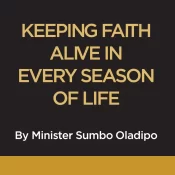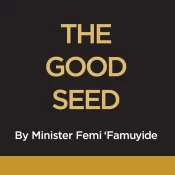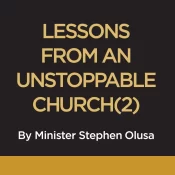- Home
- Post Single Template

LESSONS FROM AN UNSTOPPABLE CHURCH (2)
- Faith, hope, and love constitute a triad. These three elements are intended to function cohesively and inseparably. However, because we mature differently, some aspects manifest more than others. As we grow, we grow in them, and they become more visible (1 Corinthians 13:13).
- God expects us to exhibit faith, hope, and love in increasing measure. The walk of faith, the labour of love, and the patience and perseverance of hope should be present in our lives (Hebrews 10:19-24).
- The fifth evidence supporting the classification of the Thessalonian church as an unstoppable church is the evidence of transformed lives—they turned to God from idols to serve the living a n d t h e t r u e G o d ( 1 Thessalonians 1:9-10).
- No matter how you preach, you cannot bring about transformation in another person’s life. Only the Holy Spirit can do it. The sixth evidence is that the Thessalonian church is not defined by ethnicity, gender, class or any other biases—a genuine move of God is not coloured by ethnicity or any form of bias. It is strictly the power of God breaking barriers and boundaries (Acts 17:4, Galatians 3:28).
- Paul and his team modelled Christ before the Thessalonian church, and they responded accordingly. I called it apostolic reciprocation, meaning, appropriate response to appropriate labour (1 Thessalonians 2:1-12, 13).
- Apostolic conduct does not prevent you from conflict, but you must continue to speak the word of God with boldness amid the conflict. Paul and his team lived exemplary lives before the Thessalonian church (Acts 4, 1 Thessalonians 2:3- 4, TPT, 2 Thessalonians 3:7).
- What makes us unstoppable is not because everything about us is perfect; rather, we are unstoppable because we are growing and advancing ( 1 Thessalonians 3:9- 10;4:10).
- The Thessalonian church was encouraged by the comfort and edification that came from the hope of the coming of Christ. 1st and 2nd Thessalonians are considered the eschatological epistles.
- Being an unstoppable church does not guarantee the absence of unruly people (1 Thessalonians 5:14, 2 Timothy 4:10).
- Another lesson from the Thessalonian church is that the Spirit can be quenched by the people’s actions (1 Thessalonians 5:16-22).
- God is faithful to keep us unstoppable (1 Thessalonians 5:23-24).
All Categories
Recent Posts
Sumbo Oladipo0 Comments
KEEPING FAITH ALIVE IN EVERY SEASON OF LIFE
Min. Femi 'Famuyide0 Comments
THE GOOD SEED
Stephen Olusa0 Comments
LESSONS FROM AN UNSTOPPABLE CHURCH (2)
Join us for Sunday Worship Service
+234- 911-381-5851
info@thecitadeglobal.org





